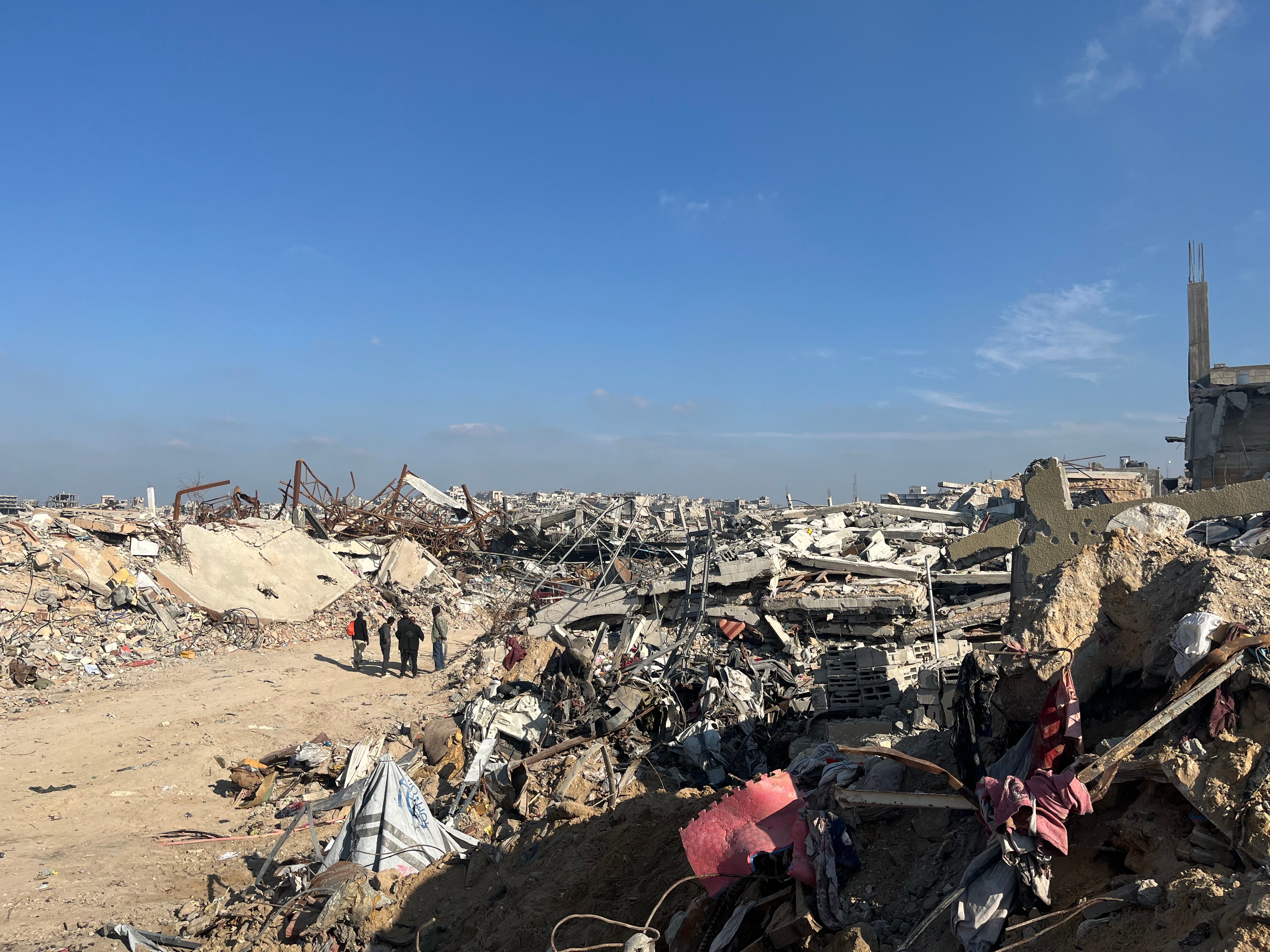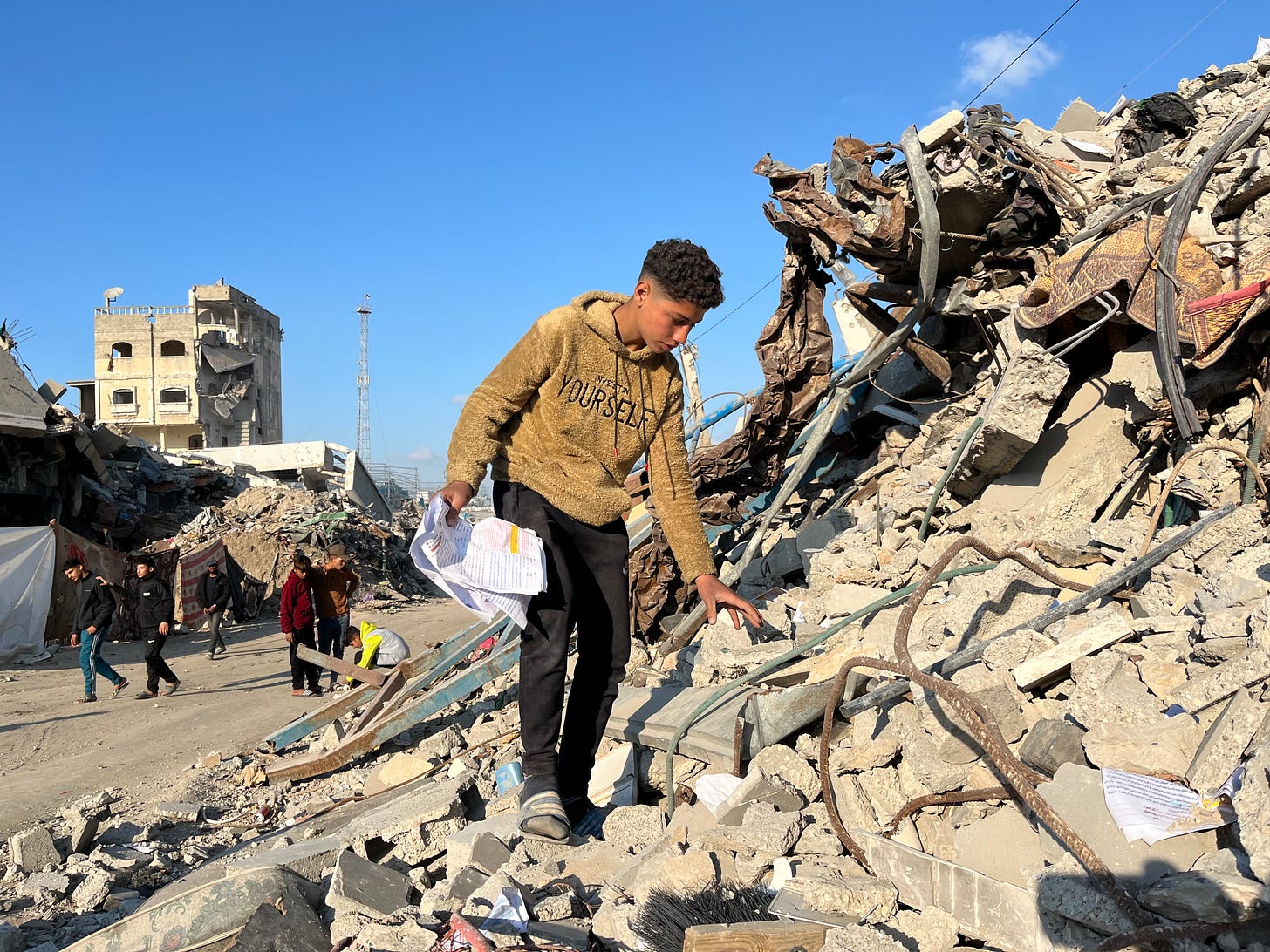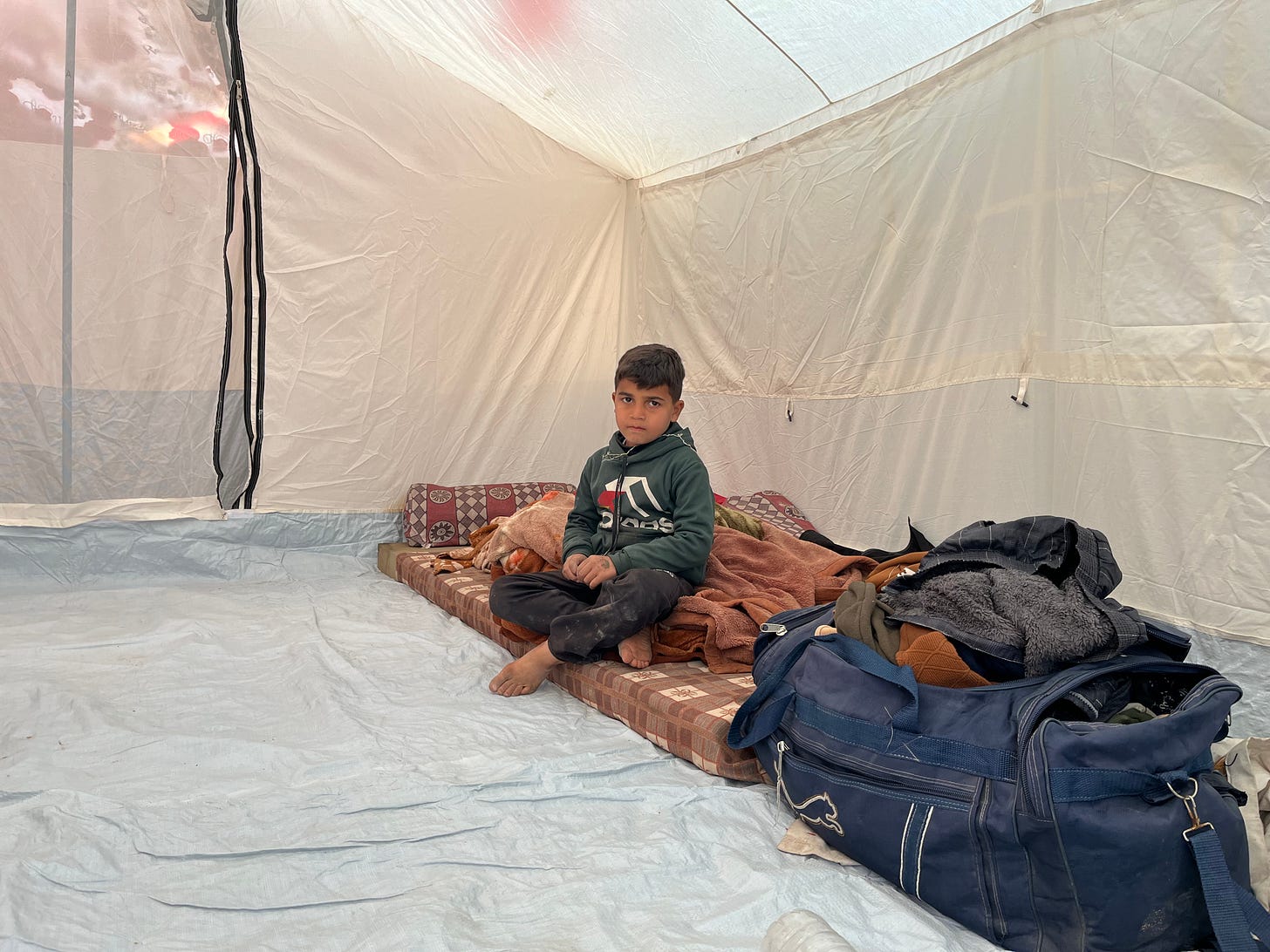Jabaliya Is Now a City of Rubble
I saw northern Gaza for the first time in 15 months: debris and dust—that is all that is left.
The destruction in northern Gaza is beyond imagination. On Sunday, I made the journey from my home in Deir al-Balah to Gaza City, my first time north after 15 months of Israel’s genocide. The three-hour, 16-kilometer walk was an arduous trek through debris and dust—that is all that is left. Every block looks like it has been hit with several powerful earthquakes.
The sheer scale of it affected me physically. No building was spared in the Israeli assault. I felt weighed down. My eyes stung from the dust in the air. At various junctures there were chainlink and razor wire fences around ramparts of sand where the Israeli military established checkpoints. I climbed over hills of rubble and took care to avoid what looked like an unexploded ordnance.
When I finally arrived in Gaza City, in the Sheikh Ejleen area near the coastal road, my hair and eyebrows had turned grey with dust. Before me, there were nothing but piles of broken concrete. People were sifting through the rubble, scavenging for anything they could find. The picturesque buildings and cafes along the coastline where I used to go are all gone—they have simply vanished. Al-Aqsa University, where I should have graduated from in 2024, lay in ruins. All that remained were some torn books and broken chairs. The buildings that were still standing were burned and partially destroyed, their foundations fragile. There were no lights anywhere.
As I passed through the devastated neighborhoods of Tal al-Hawa and al-Remal, my heart was beating heavily in my chest; I was nervous about walking through different areas for what I would see. But when I arrived at the entrance to Jabaliya refugee camp my heart stopped. As people tried to move back into their houses, Israeli forces were burning everything around. The piles of rubble were like mountains blocking our sight. The skyline was darkened by plumes of black smoke from fires set by the Israeli troops, presumably as they were withdrawing from their stations. The camp should be renamed the city of rubble. That is what it has been reduced to. A nuclear bomb dropped on the camp wouldn’t have caused this much damage.
I had to sit down to gather my composure. People were erecting tents on the rubble of their homes. Children walked around looking forlorn and dejected. Women in tattered clothing walked long distances through the debris carrying water from far parts of Jabaliya.
In Jabaliya I spoke to three children whose homes had been razed to the ground: 15-year-old Mohammed Mehsen, 12-year-old Rateb al-Helou, and 6-year-old Raed Abu-Hussein.
Mohammed and his seven-member family had been displaced multiple times, moving from place to place in the north and always plagued by hunger. His uncle and many other relatives had been killed and his brother had been wounded twice. They returned to the Jabaliya refugee camp to find their home destroyed.
“During the last 15 months, there was no life.… Our so-called life was all about carrying water and running to food distribution centers. We lacked everything and getting the simplest thing would require a lot of effort,” Mohammed told me, choking with sorrow. “Nothing has changed since we’ve returned because we have returned to piles of rubble. This is a city of ghosts, a city of rubble that can’t even shelter animals.”
“When I first saw my home in ruins, I felt a huge pang in my heart. The surge of joy that flooded through me when the ceasefire took effect has faded,” he said. “I am now taking refuge in a tent on the street with no food or water. The only thing we eat are some loaves of bread or canned food.” He has to walk two kilometers just to access water—“I can walk two kilometers here and not find one building standing,” he added.
“My hope is for Jabaliya to be reconstructed and for me to have a home instead of a tent where I am just attacked by mosquitos and flies and I have scant clothes and blankets. As a child, I didn’t have a childhood. We have just suffered constantly and experienced horrors and nightmares. I was always under fire belts and relentless attacks,” he said. “I really had loads of dreams. They were simple dreams like playing football and studying at school. But all of them have now evaporated, and my only dream is to remove the rubble and rebuild.”
Rateb and his family refused to leave northern Gaza but they were displaced from their home in Jabaliya at least four times.
“Life is so ugly,” Rateb, 12, said. “We are now in half tents with no meaning of life. It makes me sad to see the home of my family, my uncles, and my neighbors demolished. I still have nightmares from the two times when Israeli forces encircled and attacked us very ferociously. At that time, we were panicking about being killed all the time. Our life was all agony and anguish. I don’t know how we stayed here, death was near us every single minute. The most difficult moment I lived through in the war was losing my two uncles.”
“We are living under the same terrifying conditions right now. What is different is our tent is now atop the rubble of our home. We have been removing the rubble for two weeks and we haven’t finished. We know it might fall down at any time; however, we can’t do anything since we are out of solutions,” he said.
“I know they have stolen everything from me: my home, my school, my family members, and my childhood. Nevertheless, I hope things will be better. I actually don’t need anything but to rebuild my home and Gaza. I don’t want one extra thing. I have been prevented from studying, eating, and buying clothes. My ultimate hope is to have a better life very soon in my newly rebuilt home, and I hope the world will help me make it possible.”
Raed, who is just 6-years-old, also stayed with his parents and five brothers in northern Gaza. Like everyone else I met, their home had been reduced to rubble.
“All I see is destruction and rubble, nothing else. This is really hard for me. My legs hurt from the cold at night and walking long distances to get water and food. We don’t have any life here, we are just stranded in a tent over what used to be our home,” Raed said.
“During this war, I had a wish that my neighborhood would not be destroyed and my uncles would not be killed. But my wish didn’t come true. I don’t know where my neighborhood lies right now. My wish is now to learn and see Gaza standing on its feet again. I want to be like any other child around the world— to go to school, and enjoy eating all types of food.”
I am still in northern Gaza—sleeping inside the wreckage of one of my friends’ homes. The rain is torrential and threatens to waterlog us at any point. Israeli drones are buzzing overhead. The nightmare hasn’t ended. I am desperate for a cup of clean water here, for a plate of food. Donald Trump should know that these living conditions are better for me than living in a castle anywhere else in the world.









Thank you for sharing truth with the world. I am sorry that my country is involved in this destruction and genocide. I wish my shame were helpful.
Trump is just a mess and shouldn't be our president!